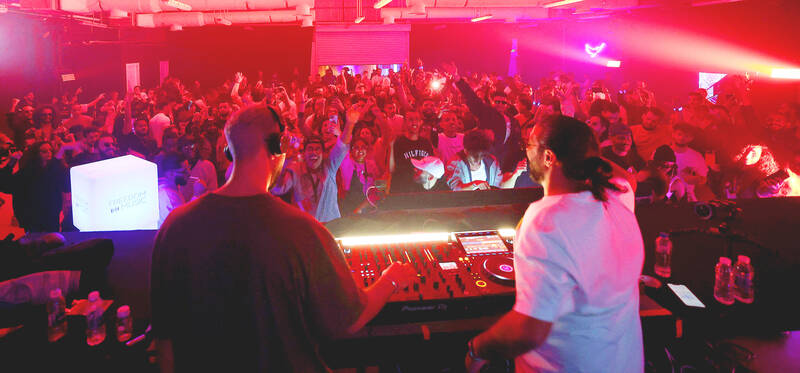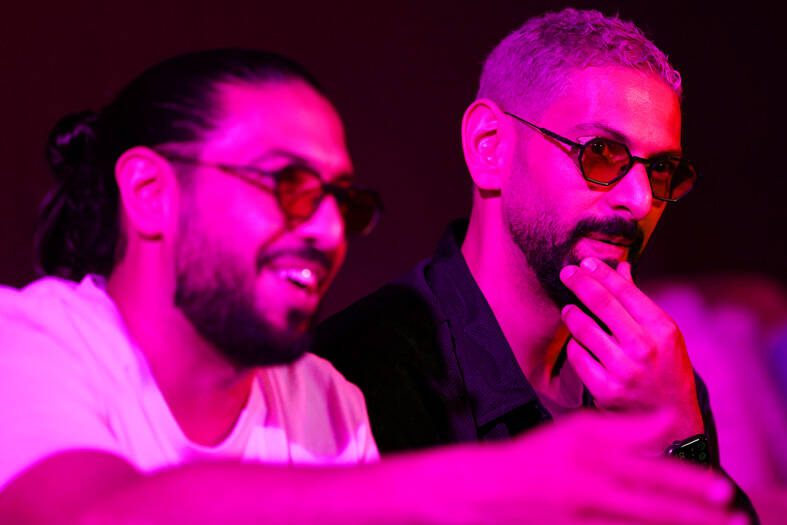Ravers sporting face paint and flashing LED sunglasses jump in time to the thudding beats of Dish Dash, a DJ act whose rise mirrors that of the Saudi Arabian music scene.
The confetti-strewn dance hall in Riyadh is packed with young men and women, most in streetwear hoodies and jeans, a few in traditional white robes and abayas.
The setting bears scant resemblance to the venues where Dish Dash — the Jeddah-born brothers Abbas and Hassan Ghazzawi — began performing more than 15 years ago. Among their early gigs were gender-segregated weddings in which the duo would be walled off from female guests.

Photo: AFP
“They used to lock us in the room. We would stay in this room for five hours and basically DJ for the wall,” Hassan Ghazzawi said, laughing. “The only way you could tell if people are enjoying it is if you hear people are screaming.”
Like other facets of cultural life in conservative but fast-changing Saudi Arabia, the music scene is undergoing a revamp, emerging as a regular stop for top global pop stars from Justin Bieber to Usher and Mariah Carey.
At this past weekend’s MDLBEAST Soundstorm festival, more than 600,000 people took in sets by the likes of Bruno Mars and DJ Khaled, organizers said.

Photo: AFP
DJ Khaled dutifully documented his sampling of Saudi Arabian food and traditional sword dancing for his 31 million Instagram followers.
Such events have helped advertise reforms championed by Saudi Arabian Crown Prince Mohammad bin Salman, who has overseen an easing of rules that once barred cinemas and gender-mixed concerts — albeit during a ramped-up repression of political dissent.
Now, Saudi Arabian performers such as Dish Dash want to take advantage of the opening-up to foster a domestic music industry that can thrive even when the spotlight veers elsewhere.
In between their sets at Soundstorm, Saudi Arabian acts said they were encouraged by the progress so far, pointing to new labels, studios and performance venues that make it easier to build careers.
Not long ago “people used to tell us: ‘Dude, you’re just wasting your time. You’re not doing anything,’ and now people are calling us to get [on] guest lists and stuff like that,” Hassan Ghazzawi said.
Nouf Sufyani, a DJ who performs under the name Cosmicat, said that she only began taking a music career seriously after the first edition of Soundstorm in 2019.
Before that, she had been working as a dentist and DJing on the side, but the buzz around the event spurred her to pursue music exclusively.
Today “I’m 100 percent able to live on music alone, and that should be a push also for anyone who wants to do music and has the talent, but hesitates,” she said.
It is an increasingly common story in a kingdom whose youthful population of 34 million represents a vast underserved market, MDLBEAST chief operating officer Talal Albahiti said.
“I keep telling people this is our new black gold,” he said, a reference to the oil that Saudi Arabia is primarily known for.
“This is the new boom, and it’s all about these creatives and what they bring to the table... I believe the next big hit or superstar will come out of this region,” he said.
However, challenges remain, notably a still-developing network of recording studios that until five or six years ago “were mainly focused on classical Arabic music” and “pretty much neglected all other genres and all other types of artists,” Albahiti said.
The process of setting up rules governing music rights, licensing and royalties is also “in its infancy still,” he added.
On top of that, Saudi Arabia’s alcohol ban could slow the emergence of a club scene that can support artists beyond sporadic festivals.
However, Hassan Ghazzawi said he believed such a scene would ultimately be viable, calling it the logical “next step.”
The changes to date have already captured the attention of artists elsewhere in the region, including from bigger markets such as Egypt. Disco Misr, an Egyptian DJ trio known for up-tempo remixes of Arabic pop classics, first played Saudi Arabia in 2019 and returned to perform in September at the Azimuth music festival in the northern desert city of al-Ula.
That event, more intimate than Soundstorm, attracted a crowd of about 1,000 to a stage nestled between sandstone mountains for two nights of dusk-to-dawn sets.
“Their baby steps are surprising. I cannot call them baby steps. It’s huge... I can only compare what’s happening in Saudi Arabia with Tomorrowland,” Disco Misr member Schady Wasfy said, referring to the Belgian electronic dance festival.
“I cannot compare [it] with anything happening in the Arab region. I’m actually surprised — I’m really surprised, and I’m hoping to see more,” he said.

DOUBLE-MURDER CASE: The officer told the dispatcher he would check the locations of the callers, but instead headed to a pizzeria, remaining there for about an hour A New Jersey officer has been charged with misconduct after prosecutors said he did not quickly respond to and properly investigate reports of a shooting that turned out to be a double murder, instead allegedly stopping at an ATM and pizzeria. Franklin Township Police Sergeant Kevin Bollaro was the on-duty officer on the evening of Aug. 1, when police received 911 calls reporting gunshots and screaming in Pittstown, about 96km from Manhattan in central New Jersey, Hunterdon County Prosecutor Renee Robeson’s office said. However, rather than responding immediately, prosecutors said GPS data and surveillance video showed Bollaro drove about 3km

Tens of thousands of people on Saturday took to the streets of Spain’s eastern city of Valencia to mark the first anniversary of floods that killed 229 people and to denounce the handling of the disaster. Demonstrators, many carrying photos of the victims, called on regional government head Carlos Mazon to resign over what they said was the slow response to one of Europe’s deadliest natural disasters in decades. “People are still really angry,” said Rosa Cerros, a 42-year-old government worker who took part with her husband and two young daughters. “Why weren’t people evacuated? Its incomprehensible,” she said. Mazon’s

‘MOTHER’ OF THAILAND: In her glamorous heyday in the 1960s, former Thai queen Sirikit mingled with US presidents and superstars such as Elvis Presley The year-long funeral ceremony of former Thai queen Sirikit started yesterday, with grieving royalists set to salute the procession bringing her body to lie in state at Bangkok’s Grand Palace. Members of the royal family are venerated in Thailand, treated by many as semi-divine figures, and lavished with glowing media coverage and gold-adorned portraits hanging in public spaces and private homes nationwide. Sirikit, the mother of Thai King Vajiralongkorn and widow of the nation’s longest-reigning monarch, died late on Friday at the age of 93. Black-and-white tributes to the royal matriarch are being beamed onto towering digital advertizing billboards, on

POWER ABUSE WORRY: Some people warned that the broad language of the treaty could lead to overreach by authorities and enable the repression of government critics Countries signed their first UN treaty targeting cybercrime in Hanoi yesterday, despite opposition from an unlikely band of tech companies and rights groups warning of expanded state surveillance. The new global legal framework aims to bolster international cooperation to fight digital crimes, from child pornography to transnational cyberscams and money laundering. More than 60 countries signed the declaration, which means it would go into force once ratified by those states. UN Secretary-General Antonio Guterres described the signing as an “important milestone,” and that it was “only the beginning.” “Every day, sophisticated scams destroy families, steal migrants and drain billions of dollars from our economy...